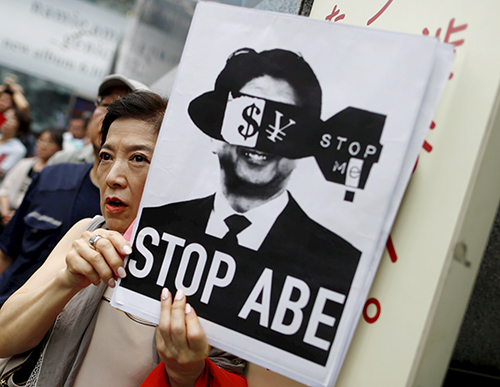Abe shoots himself in the foot with his talk of 'targeting China'
(China Daily) Updated: 2015-07-01 07:55
 |
|
A protester holding a placard participates in a rally against Japanese Prime Minister Shinzo Abe's administration in Tokyo, Japan, June 27, 2015. Hundreds of people joined the demonstration on Saturday against Abe's policies in Tokyo's Shibuya area. [Photo/Agencies] |
Japanese Prime Minister Shinzo Abe admitted at a meal with high-ranking media figures in early June that the "new security bills under legislation are targeted at China in the South China Sea", according to the country's Gendai Business Weekly on Monday. Although warned not to report Abe's remarks, some of those in attendance who are concerned about the legislation still informed the magazine and other media. Comments:
Abe's comments may have revealed his administration's core purpose embedded in Tokyo's China policy, which is based on confrontation with its neighbor. What is also incorrect and unhealthy is his attempt to instill hatred and a Cold War mentality into the innocent Japanese people.
Zhou Yongsheng, a professor of Japanese studies at China Foreign Affairs University, June 30
The unexpected exposure of Abe's off-the-record comments also puts the Japanese media in the spotlight. Knowing that media outlets play a vital role in influencing public opinion, Abe's office has long supervised and intimidated local journalists, forcing them to endorse the prime minister and his right-wing followers. Such a leak might end up serving as a further slap in the face for the freedom of the press in Japan.
takungpao.com, June 30
The truth is, this is not the first time Abe has sought to instigate tensions over the South China Sea as part of his ambition to lift the ban on Japan's right to collective defense. In addition, by encouraging regional claimants such as the Philippines and Vietnam to challenge and distract China with their territorial disputes, Abe believes that his country is more likely to claim the sovereignty of the disputed Diaoyu Islands in the East China Sea. However, it is Japan that will eventually fall prey to the regional unrest he aims to create.
People's Daily Overseas Edition, June 30
One thing is clear, Abe is not worth high expectations given his irresponsible and incautious words and abnormal conduct, which may consist of his personal misperceptions that are influencing Japan's foreign policy.
Global Times, June 30











